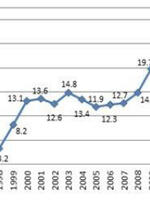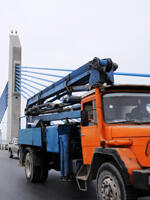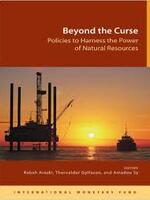Filter by...
Reset all
Publications (68)
Working Paper
pdf
This study examines the relationship between urbanization and structural transformation in Lagos. Specifically, the study focuses on spatial distribution of economic activities, and the patterns and drivers of, as well as constraints to, structural transformation in the city of Lagos from a...
Working Paper
pdf
Violent conflicts act as disincentives for sustainable socioeconomic development in conflict-prone societies, especially in the Global South. Existing studies focus largely on economic, political, and social triggers of violent conflicts; cultural factors, while important, are often not considered...
Working Paper
pdf
Education is associated with a range of positive micro and macro effects. It is hence no surprise that donors have recently increased the amount of official development aid specifically focused on restoring and maintaining education in less-developed states. While much attention has been paid to the...

Apart from a ‘badly flawed’ national election, insecurity, and mass exodus of its young talents to the Global North (locally known as Japa), a paralyzing debt burden is among the existential threats facing Nigeria, Africa’s largest and most populous economy. Between 1999—when democracy returned—and...
Working Paper
pdf
– COVID-19 and climate change
Terrorist and other types of armed groups often exploit natural and human-made disasters and emergencies to advance their causes. This paper studies how some armed groups have responded to two recent global emergencies—climate change and the COVID-19 pandemic. It examines the messaging and actions...
Working Paper
pdf
The federal character principle is Nigeria’s primary formula for mitigating horizontal inequality and conflict in this chronically fractured society. Designed to guarantee inter-group inclusion in the conduct and composition of governmental institutions, the principle spans direct, integrative, and...
Working Paper
pdf
There has been much discussion on climate change and its adverse effects on agriculture, including excessive loss of food production. In regions such as sub-Saharan Africa, where agriculture is the major source of household livelihoods, shocks in weather patterns affect farmers’ expectations of farm...
Working Paper
pdf
– Evidence from transaction-level data in Nigeria
Research on profit shifting by multinational corporations in developing countries is limited due to a lack of data. In this paper we use, for the first time, novel administrative data on the transactions of multinational corporations operating in Nigeria vis-à-vis related parties in other...
Working Paper
– Empirical evidence from Nigeria
The lingering policy dilemma facing many governments in sub-Saharan Africa in recent years is what can be done in the short to medium term to boost the output and incomes of individuals and enterprises in the informal sector, given the size and persistence of the sector in the region. In this paper...
Working Paper
pdf
– A livelihood analysis
This study evaluates the effects of the informal sector on Nigerian workers’ livelihoods and analyses workers’ transitions within the informal sector and between informal and formal employment. A binary logit model is applied to General Household Survey panel data for the periods 2010/11, 2012/13...
Journal Article
This study examines the implications of alternative monetary policy regimes to deal with resource revenue shocks when fiscal policy is laissez-faire—that is, when the government spends all resource revenue windfalls contemporaneously. A three-sector dynamic stochastic general equilibrium model is...
Journal Article
This peer-reviewed research is available free of charge. UNU-WIDER believes that research is a global public good and supports Open Access.
Part of Journal Special Issue
Horizontal Inequality: Persistence and Change
Journal Article
This peer-reviewed research is available free of charge. UNU-WIDER believes that research is a global public good and supports Open Access.
– Patterns of polarization in Nigeria
Part of Journal Special Issue
Inequality
Working Paper
pdf
This paper delves into the relationship between child nutritional outcome and (multiple) female work status in Nigeria from a micro perspective. The child nutritional outcome is proxied by child weight-for-age. Female work includes wage employment outside the household, household on-farm...
Working Paper
pdf
– Ethnicity, integration, and attitudes toward elected officials in urban Nigeria
In the developing world, clientelism is common. In Africa, public office is often used to redistribute resources to ethnically defined constituencies, and this form of clientelistic exchange is a key determinant of vote choice. Does clientelistic exchange shape trust in elected officials as well...
Working Paper
pdf
– Lessons from Nigeria and Ghana
Donor interest in the extractives sector is based upon the premise that it represents an opportunity to improve a country’s development prospects. However, in many cases the presence of extractive resources is associated with poor economic performance. As a result, some donors are trying a radically...
Working Paper
pdf
Horizontal inequality by ethnic group has remained remarkably persistent for wealth, education, and access to certain services in Nigeria. While significant gains in the reduction of inequality and improvement in access have been made for more locally administered services, outcomes are stickier and...
Working Paper
pdf
– Evidence from Nigeria
This paper delves into the effect of female bargaining power on child education and labor outcomes in Nigeria. Female bargaining power is proxied by female say on labor income, rather than by female income per se. This is motivated by the fact female labor force participation might be low in some...
Journal Article
This peer-reviewed research is available free of charge. UNU-WIDER believes that research is a global public good and supports Open Access.
– A retrospective approach to research inquiry
This article examines the impacts of the financial, food and fuel crises on poor and vulnerable households in two states of Nigeria: Lagos and Kano. It uses retrospective household-level data to analyze the impacts of induced price variability on household welfare. The results indicate that...

Nigeria, sub-Saharan Africa’s biggest economy and most populous country, has recorded high growth in recent years. Indeed, real GDP growth rate was 6.31 in 2014 (compared to the regional average of 4.35). Life expectancy has also increased (by 6.9 years since 1980) and so has mean years of schooling...
Book Chapter
From the book:
Growth and Poverty in Sub-Saharan Africa
Working Paper
pdf
– Application to Nigeria
This study considers the implications of alternative monetary policy regimes to deal with a laissez-faire fiscal policy rule, where the government completely spends resource revenue windfall contemporaneously. A three sector dynamic stochastic general equilibrium model, which features key structural...
Working Paper
pdf
In order to implement clean energy transition programmes, the national and sub-national governments in Nigeria will incur some cost. In the same way, failure to implement the policies will come with some costs. This paper therefore considers the fiscal policy implications of Nigerian governments’...
Working Paper
pdf
The Nigerian power sector reform is necessitated by the chronic poor performance of the sector and has as its compass the 2005 Electric Power Sector Reform Act and the Roadmap for Power Sector Reform 2010. Implementing reform has resulted in significant progress that includes unbundling and...
Working Paper
pdf
– Political economy issues and policy vistas
This study reviews the political economy issues surrounding the 2008 food crisis in Nigeria; the lessons learned from management of the crisis; analyses the performance of policies aimed at stabilizing prices; and proffers policy measures for preventing future occurrence. The study finds that the...
Working Paper
pdf
Nigeria has recorded impressive growth in the last decade, yet the impact of this growth on poverty reduction remains unclear. This paper appraises spatial and temporal non-monetary multidimensional poverty in Nigeria using the first-order dominance approach. It examines five welfare indicators...
Working Paper
pdf
This study examines the relationship between growth and employment in Nigeria to gain insights into the country's paradox of high economic growth alongside rising poverty and inequality. The methodology adopted is the Shapley decomposition approach, complemented with econometric estimation of the...
Journal Article
This peer-reviewed research is available free of charge. UNU-WIDER believes that research is a global public good and supports Open Access.
– comparing Indonesia and Nigeria
Part of Journal Special Issue
Aid to Support Fragile States

– Bad Luck or Bad Policy?
16 December 2014 John Page On 20 November 2014 the United Nations celebrated the 25th Africa Industrialization Day. But perhaps ‘celebrate’ is not exactly the right word. Africa’s experience with industrialization over the past quarter century has actually been disappointing. In 2010, sub-Saharan...
Working Paper
pdf
– Patterns of Polarization in Nigeria
Our hypothesis is that Nigeria is going through a process of economic polarization. An analysis of this type is new for Nigeria; the limited availability of comparable data has hindered an investigation that requires data series not too close in time. The present paper tries to overcome this...
Working Paper
pdf
– First Order Dominance Approach
This study appraises non-monetary multidimensional poverty in Nigeria using the novel first order dominance approach developed by Arndt et al. (2012). It examines five dimensions of deprivation: education, water, sanitation, shelter, and energy-using comparable datasets, the Nigeria Demographic and...
Book Chapter
From the book:
Food Price Policy in an Era of Market Instability
Working Paper
pdf
– Comparing Indonesia and Nigeria
This paper analyses the role of foreign aid to assist development in two oil-rich countries: Indonesia and Nigeria. This paper seeks to understand the way foreign aid provided assistance to transform Indonesia from a ‘fragile’ state in the 1960s into one of the ‘Asian Tigers’ in the mid-1990s, and...
Working Paper
pdf
– Lessons and Challenges
The structure of the Nigerian economy is typical of an underdeveloped country. The primary sector, in particular, the oil and gas sector, dominates the gross domestic product accounting for over 95 per cent of export earnings and about 85 per cent of government revenue between 2011 and 2012. The...
Blog
22 August 2013 Roger Williamson Given the high growth rates since 2000 and low labour costs, Africa could develop manufacturing industry, agro-processing, and services. But these cost advantages can easily be undermined by factors such as inadequate infrastructure, particularly power, transportation...
Blog
29 June 2013 Tony Addison The June-July summer issue of Angle comes to you amid the 19 hours daylight of the Finnish mid-summer. Last week UNU-WIDER’s Learning to Compete (L2C) conference on industrial policy and development in Africa was held here in Helsinki. We welcomed 200 researchers and policy...
Working Paper
pdf
– a Retrospective Approach for Research Enquiry
This paper examines the impacts of the financial, food and fuel crises on the livelihoods of low-income households Nigeria. It uses primary household level data from Nigeria to analyse the impacts of induced price variability on household welfare. Our results indicate that aggregate shocks have...
Blog
– An Interview with Andy McKay
25 February 2013 Andy McKay, professor of development economics at University of Sussex, discusses the motivating factors behind UNU-WIDER’s Growth and Poverty Project (GAPP) with Carl-Gustav Lindén, senior communications specialist at UNU-WIDER. In the GAPP project Africa’s growth, poverty and...
Working Paper
pdf
The food crisis of 2008 in Nigeria was influenced by price changes in the world market and the escalation of the price of imported fuel into Nigeria which led to sharp increases in the prices of agricultural inputs and transportation cost. The soaring prices of food staples benefited the producers...
Blog
30 October 2012 At the recent UNU-WIDER research conference on development and climate change, the communications team took the opportunity to ask participants visiting us here in Helsinki for their views on how research turns into policy. We heard many interesting perspectives and they are...
Working Paper
pdf
– A Tale of Two Countries
The current paper demonstrates a dichotomy of the growth response to changes in the barter terms of trade, employing as case studies the two African countries, Botswana and Nigeria. Using distributed-lag analysis, the paper finds that the effect of terms of trade on output is positive and negative...

– Contrasting Evidence from Two Countries
The current paper demonstrates a dichotomy of the growth response to changes in the barter terms of trade, employing as case studies the two African countries, Botswana and Nigeria. Using distributed-lag analysis, the paper finds that the effect of terms of trade on output is positive and negative...
Journal Article
– Implications for Urban Development in Nigeria
Part of Journal Special Issue
African Development in an Urban World
Journal Article
– Urban Governance and the Politics of Popular Livelihoods in Nigeria
Part of Journal Special Issue
African Development in an Urban World
Working Paper
pdf
– Urban Governance and the Politics of Popular Livelihoods in Nigeria
This paper examines how decentralization and informalization are reshaping urban governance in contemporary Africa. By exploring the interface between urban institutional failures and popular organizational solutions, the paper considers how informal governance processes feed into wider structural...
Displaying 48 of 68 results
 Join the network
Join the network
